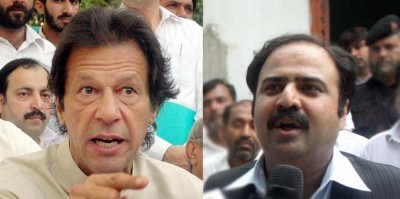

When Pakistan Tehreek-e-Insaf Chairman Imran Khan boasted at every rally before the May 11 polls that he had solution for every problem within 90 days, people questioned his vision.
Though most people did not doubt his honesty, they found his approach to the country’s deep-seated problems unrealistic. They wondered how corruption will fade away; how education, health, patwari and thana culture will change in 90 days.
Imran Khan argued that honest leadership can do it -- hinting at the success of Shaukat Khanam Memorial Hospital and the Pakistan cricket team’s World Cup victory under his captaincy. Basically, the PTI set for itself an ambitious agenda pre-elections.
But now, after six months in the government in Khyber Pakhtunkhwa, it looks unprepared and confused -- and unable to deal with the endemic problems.
Perhaps, the pre-election fears that Imran was being overambitious were not all that misplaced.
"The PTI government is misdirected, quite off the track," says Professor Ijaz Khan of the Department of International Relations, University of Peshawar.
People feel the PTI government in KP is unwilling to tackle terrorism. After every terror attack, Imran has suggested something to appease the terrorists, and in the process causing public anger. He has talked about talking with Taliban, stopping drone strikes, and allowing Taliban to open office.
"Imran treats terrorism as a struggle by tribal people and advocates negotiations. But the tribesmen have not stood up to demand their rights; it is the tribal region that is being used by local and foreign terrorists," explains Ijaz Khan.
Meanwhile, in KP, the PTI’s popularity bubble has burst. It has sacked two ministers of Aftab Sherpao’s Qaumi Watan Party (QWP) on corruption charges -- a move that may have damaged the QWP and earned some appreciation for the PTI.
"This is a new phenomenon in Pakistani politics that an alliance is broken on charges of corruption," said Iqbal Khattak, a senior analyst. However, at this time, "It’s difficult to say if the decision will strengthen or weaken the PTI."
Iqbal Khattak believes Imran Khan wants to introduce the politics of principles in Pakistan.
Prof. Ijaz Khan refuses to accept that the PTI decided to part ways with the QWP due to corruption charges.
With 66 MPAs in the 124-member house on its side, the PTI is secure. It has also managed to muster the support of the opposition parties, including the QWP, that they will not destabilise the provincial government.
However, if the situation deteriorates the provincial assembly may be dissolved.
Generally, though the PTI leaders hailed the sacking of the QWP ministers, some have shown surprise over the PTI sparing its own corrupt ministers. "We demand action against the corrupt ministers in our party," says Zafar Khattak, the PTI’s former city district president of Peshawar.
Another PTI leader who requested anonymity says targeting the QWP ministers alone was wrong -- "We should have made our ministers an example."
But according to the PTI’s provincial spokesman, Ishtiaq Urmar, his party ministers will face action in the second phase.
Sikandar Sherpao, QWP provincial chief and a senior minister before the breaking of alliance, says his party was made a "scapegoat".
He says, public pressure was mounting on the PTI for not delivering, so Imran sacked the QWP ministers to suppress criticism. "The PTI government has failed to launch a single development project in the province and predicted no development was possible this year. We have to build our destroyed schools, roads, hospitals and other infrastructure but it seems it’s not the PTI’s priority. No fund has been released so far from the Rs83 billion aid pledged by ADP," he tells TNS.
Sherpao claims the graft charges against the ministers were never discussed at party meetings. In fact, "Just a day before the ministers’ sacking, we asked the PTI leaders if they had any complaints. And they said, no," he says.
The policies of the PTI and QWP differed -- Khan demanded Taliban office, Sherpao didn’t; Khan wanted changes in curriculum targeting lessons on Pakhtun leaders, Sherpao didn’t; Khan wanted ‘one-man show’, Sherpao rejected it; Khan set deadlines, Sherpao discouraged them. And when Imran Khan employed consultants from Punjab to find solutions to the province’s problems, the QWP opposed it. "The consultants were people who had lost election in Punjab. They knew nothing about our problems," says Sikandar Sherpao, adding, "They were trying to solve Lahore’s problems in Peshawar."
Iqbal Khattak says the problems in KP are complex and it is unfair to expect the PTI to solve them in six months. He praised PTI for introducing Ehtisaab and Right to Information acts and e-governance.